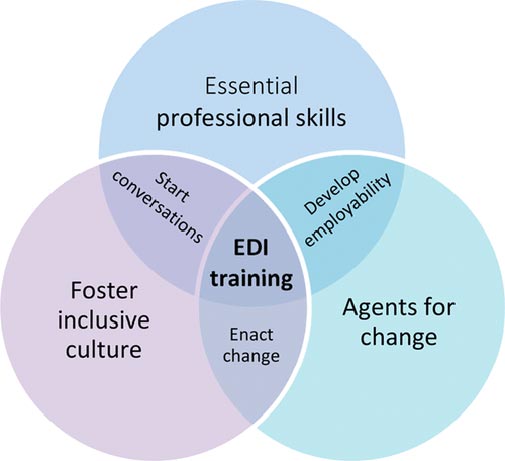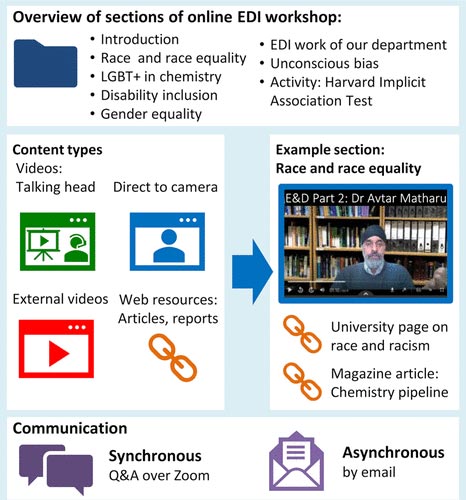Inclusive Training of the Next Generation of Professional Chemists
Two recent papers published in Journal of Chemical Education highlight the innovative ways the Department of Chemistry is approaching the training of undergraduate students and graduate teaching assistants.

Two recent papers published in Journal of Chemical Education highlight the innovative ways the Department of Chemistry at the University of York is approaching the training of undergraduate students and graduate teaching assistants. The work aims to foster an inclusive culture within the Department, influence others beyond the department, and develop the next generation of professional chemists to act as agents for change.
Equality and Diversity Training
It is perhaps surprising that although undergraduates receive extensive training and teaching across their degree, very rarely does any of this address equality, diversity and inclusion (EDI). The recent introduction of an online EDI training workshop in the Department of Chemistry at York aims to revolutionise the Skills training provided to first year undergraduate students at the beginning of their degree and set them up to succeed both in their university studies, and their future lives as professional chemists.
Authentic Voices

Overview of online EDI training for first year undergraduates.
The training incorporates short authentic videos from a diverse range of departmental voices. This provides students with insights into how they can access support, act as allies, and respect diverse peers. This prepares students for study within the department, particularly activities such as group practical work and tutorial group teaching. Beyond that, it helps prepare them for their professional life in chemistry, where many of them will take on leadership positions. Specifically, the training explores issues faced by black and ethnic minority scientists, women in STEM, LGBT+ individuals, and disabled scientists. Students also carry out an exercise in unconscious bias and learn about the ethos of the department and its diversity work.
Reflecting on this innovative training, Employability and Diversity Officer, Dr Leonie Jones said: “Hearing staff talk about their own experiences, or their professional insights into EDI, supported by data and evidence, engages students with the subject and allows them to see its practical relevance in the real-world.”
Training Graduate Teaching Assistants
Synergistic with work to train undergraduates in EDI, we also developed training for our graduate teaching assistants (GTAs). GTAs help support the learning of our undergraduate students, particularly in Teaching Labs. The overarching aim of providing them with EDI training was to improve the equity of student experience in undergraduate chemistry laboratories, an issue which had been raised through undergraduate feedback. We aimed to achieve this by improving GTA awareness of inclusive teaching practices and EDI principles, encouraging reflection, and sharing inclusive teaching practices.

Overview of EDI training for graduate teaching assistants (GTAs).
It was found that encouraging students to reflect on inclusive learning environments, cultures, and practices was highly valued by GTAs. In addition, the participants engaged in rich discussion of inclusive teaching and drew from their lived experiences. Indeed, when developing EDI training for GTAs, the session had been designed to empower them, and value their contributions. As Dr Julia Sarju reflects: “Graduate students have a diversity of lived experiences which are likely to be closer to undergraduates when compared with faculty and senior faculty, and there is higher representation of minorities. It was therefore vital to value and harness their own lived experiences and, in many cases, recent experiences of learning in undergraduate chemistry laboratories.”
Reflections
Reflecting on EDI training at both undergraduate and graduate levels, the new Head of Department, Professor Caroline Dessent said: “In the longer term, transforming the culture of chemistry, requires the next generation of scientists to be aware of cultural issues and committed to equity, inclusion and empowerment. We believe that providing formal training in these aspects enables our students to go on to be agents for change. We also hope that other Chemistry Departments develop EDI training programs for their students, and are making materials available to help them in doing so.”
The Department of Chemistry at the University of York recognises the importance of equal participation, progression and success for all, striving to provide a working, learning, social and living environment that will enable all our staff and students to contribute fully, to flourish and to excel. The Department of Chemistry has held an Athena SWAN Gold Award continuously since 2007, recognising the work it has carried out to support and promote the careers of women in science.
The papers are published in Journal of Chemical Education.
- What Makes a Professional Chemist? Embedding Equality, Diversity, and Inclusion into Chemistry Skills Training for Undergraduates.
- Improving the Equity of Undergraduate Practical Laboratory Chemistry: Incorporating Inclusive Teaching and Accessibility Awareness into Chemistry Graduate Teaching Assistant Training.